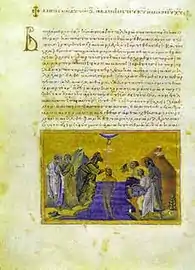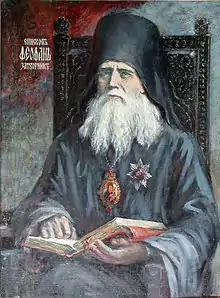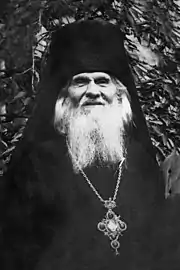January 5 - Eastern Orthodox liturgical calendar - January 7
All fixed commemorations below are observed on January 19 by Eastern Orthodox Churches on the Old Calendar.[note 1]
For January 6th, Orthodox Churches on the Old Calendar commemorate the Saints listed on December 24.
Feasts
- The Holy Theophany of Our Lord, God, and Saviour Jesus Christ (Baptism of the Lord) - Cross Procession with Great Blessing of Waters outdoors.[1][2][note 2][note 3]
- Traditionally, the beginning of the season of house blessings with Holy Water.
Saints
Pre-Schism Western saints
- Martyrs of North-West Africa, burnt at the stake under Septimius Severus (c. 210)[6][note 5]
- Virgin-martyr Macra, from Rheims in France, martyred in Fismes in Champagne before the persecution under Diocletian began (287)[6][note 6]
- Martyr Anastasius, a martyr in Syrmium in Pannonia, now Hungary (4th century)[6]
- Martyrs Anastasius, Jucundus, Florus, Florianus, Peter, Ratites, Tatia and Tilis, in Syrmium in Pannonia, now Hungary (4th century)[6]
- Saint Hywyn, probably a companion of St Cadfan on his return journey from Brittany to Cornwall and Wales; by tradition he founded Aberdaron in Gwynedd (516)[6]
- Saint Melanius (Melaine), born in Brittany, he was Bishop of Rennes and succeeded in overcoming idolatry in his diocese (c. 535)[6][note 7]
- Saint Edeyrn (Eternus), born in Britain, he was hermit and the patron saint of a church in Brittany (6th century)[6]
- Saint Eigrad (Eugrad), a brother of St. Samson, he was a disciple of St Illtyd and founded a church in Anglesey in Wales (6th century)[6]
- Saint Schotin (Scarthin), a disciple of St David in Wales, lived as a hermit on Mt Mairge in Leix (County Laois) for many years (6th century)[6] (see also: January 2)
- Saint Merinus (Mirren of Benchor), a disciple of Dunawd at Bangor in Wales and venerated there and in Brittany (6th century)[6]
- Saint Peter of Canterbury, a monk from St Andrew's in Rome, he was one of the first missionaries sent to England (c. 607)[6][note 8]
- Saint Diman (Dimas, Dima), a monk with St Columba and afterwards Bishop of Connor in Ireland (658)[6]
- Venerable Wiltrudis, founded the convent of Bergen near Neuburg in Germany (c. 976) and herself became a nun and the first Abbess (986)[6]
- Saint Frederick of Arras, a monk at St Vanne and later St Vedast Abbey in Arras (1020)[6]
Post-Schism Orthodox saints
- Martyr Assad the tailor (1218)[8]
- New Hieromartyr Romanus, priest of Lacedemonia, at Constantinople, by the sword (1695)[1][9]
- Saint Theophan the Recluse Bishop of Tambov (1894)[1][10][note 9]
- Saint Laurence of Chernigov Convent, Wonderworker (1950)[1][3]
New martyrs and confessors
- New Hieromartyr Archpriest Andrew Zimin, his wife Lydia, his mother-in-law Domnica, his two daughters and his servant Maria, of Ussurisk, Siberia (1919)[1][12]
Other commemorations
- Repose of Schemamonk Nicholas of Valaam (1824)[1][13]
- Repose of Schemamonk Sergius (Yanovsky) (1876), disciple of St. Herman of Alaska.[1][14]
Icon gallery
 Mural from the interior of St. John the Baptist Church at the Jordan River, depicting Jesus' baptism. (The Holy Theophany of Our Lord, God, and Saviour Jesus Christ)
Mural from the interior of St. John the Baptist Church at the Jordan River, depicting Jesus' baptism. (The Holy Theophany of Our Lord, God, and Saviour Jesus Christ) The Baptism of Christ. (Menologion of Basil II, 10th century)
The Baptism of Christ. (Menologion of Basil II, 10th century).jpg.webp) Baptism of the Lord. Church of the Assumption of the Mother of God, Kilillo-Byelozhersk (1497).
Baptism of the Lord. Church of the Assumption of the Mother of God, Kilillo-Byelozhersk (1497). The Baptism of Our Lord. Miracle-working icon. 17th century. Novo-Tikhvinsky Convent.
The Baptism of Our Lord. Miracle-working icon. 17th century. Novo-Tikhvinsky Convent. Saint Theophan the Recluse.
Saint Theophan the Recluse. Venerable Laurence of Chernigov.
Venerable Laurence of Chernigov.
Notes
- ↑ The notation Old Style or (OS) is sometimes used to indicate a date in the Julian Calendar (which is used by churches on the "Old Calendar").
The notation New Style or (NS), indicates a date in the Revised Julian calendar (which is used by churches on the "New Calendar"). - ↑ A traditional greeting in some places, during the Theophany season, is: "Christ is baptized!" The response is, "In the waters of the Jordan!"[3]
- ↑ Name days celebrated today include:
- Fotis (Φώτης);
- Photini (Φωτεινή);
- Theophanis or Theophan (Θεοφάνης);
- Theophania (Θεοφάνεια);
- Fanis (Φάνης);
- Fanny or Faye (Φανή);
- Jordan (Ἰορδάνης);
- Theano (Θεανῶ);
- Ourania or Rania (Οὐρανία); and
- Theopoula (Θεοπούλα).
- ↑ The Venerable Evagrius came from Iberia and was the son of a priest. He was ordained as Reader by Saint Basil the Great and Deacon by St. Basil's brother, Bishop St. Gregory of Nyssa. God endowed him with the gift of oratory. However from this he was led to pride and almost lost his prudence, since the sin of selfishness (egoism) led him to fall in love with a rich woman. But he came to repentance and guided his steps to Jerusalem, where he again faced the temptation of pride. The Blessed Melania the Roman († December 31) became his spiritual adviser, who practiced her ascetism in a small cell (hermitage) of Jerusalem. Thus, St Evagrius took refuge to a certain Mount of Nitria, where he lived the solitary regime of prayer, fasting and abstinence. God did not abandon him and blessed him with the gift of clairvoyance. The Blessed Evagrius reposed peacefully around 415 AD.[4]
- ↑ "In Africa, the commemoration of many holy martyrs, who were burned at the stake in the persecution of Severus."[7]
- ↑ "In the Diocese of Rheims, the martyrdom of St. Macra, virgin, who, in the persecution of Diocletian, was cast into the fire by order of the governor Rictiovarus. As she remained uninjured, she had her breasts cut off, was imprisoned in a foul dungeon, rolled upon broken earthenware and burning coals, and finally she gave up her soul while engaged in prayer."[7]
- ↑ "At Rennes, in France, St. Melanius, bishop and confessor, who, after a life remarkable for virtues innumerable, with his thoughts constantly fixed on heaven, gloriously departed from this world."[7]
- ↑ He became first Abbot of Sts Peter and Paul (later St Augustine's), founded in Canterbury. While travelling to France he was drowned off Ambleteuse near Boulogne, where his relics are still honoured.
- ↑ He reposed on January 6, 1894. His service is celebrated on January 10. (Note that the Greek Synaxarion shows him on January 5th.[11])
References
- 1 2 3 4 5 6 7 January 6/January 19. Orthodox Calendar (PRAVOSLAVIE.RU).
- ↑ Great Synaxaristes: (in Greek): Τὰ Ἅγια Θεοφάνεια τοῦ Κυρίου ἡμῶν Ἰησοῦ Χρηστοῦ. 6 ΙΑΝΟΥΑΡΙΟΥ. ΜΕΓΑΣ ΣΥΝΑΞΑΡΙΣΤΗΣ.
- 1 2 The Autonomous Orthodox Metropolia of Western Europe and the Americas (ROCOR). St. Hilarion Calendar of Saints for the year of our Lord 2004. St. Hilarion Press (Austin, TX). pp.5-6.
- 1 2 Great Synaxaristes: (in Greek): Ὁ Ὅσιος Εὐάγριος. 6 ΙΑΝΟΥΑΡΙΟΥ. ΜΕΓΑΣ ΣΥΝΑΞΑΡΙΣΤΗΣ.
- ↑ Great Synaxaristes: (in Greek): Ὁ Ὅσιος Γεώργιος ὁ Πέρσης. 6 ΙΑΝΟΥΑΡΙΟΥ. ΜΕΓΑΣ ΣΥΝΑΞΑΡΙΣΤΗΣ.
- 1 2 3 4 5 6 7 8 9 10 11 12 13 14 January 6. Latin Saints of the Orthodox Patriarchate of Rome.
- 1 2 3 The Roman Martyrology. Transl. by the Archbishop of Baltimore. Last Edition, According to the Copy Printed at Rome in 1914. Revised Edition, with the Imprimatur of His Eminence Cardinal Gibbons. Baltimore: John Murphy Company, 1916. p.7.
- ↑ Great Synaxaristes: (in Greek): Ὁ Ἅγιος Ἄσσαντ ὁ Ράπτης. 6 ΙΑΝΟΥΑΡΙΟΥ. ΜΕΓΑΣ ΣΥΝΑΞΑΡΙΣΤΗΣ.
- ↑ Great Synaxaristes: (in Greek): Ὁ Ἅγιος Ρωμανὸς ὁ Λακεδαίμονας. 6 ΙΑΝΟΥΑΡΙΟΥ. ΜΕΓΑΣ ΣΥΝΑΞΑΡΙΣΤΗΣ.
- ↑ (in Russian) 6 января (ст.ст.) 19 января 2013 (нов. ст.) Archived 2019-10-20 at the Wayback Machine. Русская Православная Церковь Отдел внешних церковных связей. (DECR).
- ↑ Great Synaxaristes: (in Greek): Ὁ Ὅσιος Θεοφάνης ὁ Ἔγκλειστος. 5 ΙΑΝΟΥΑΡΙΟΥ. ΜΕΓΑΣ ΣΥΝΑΞΑΡΙΣΤΗΣ.
- ↑ Great Synaxaristes: (in Greek): Ὁ Ἅγιος Ἀνδρέας καὶ οἱ σὺν αὐτῷ δύο θυγατέρες του καὶ οἱ νεομάρτυρες γυναῖκες Λυδία, Δομνίκη καὶ Μαρία. 6 ΙΑΝΟΥΑΡΙΟΥ. ΜΕΓΑΣ ΣΥΝΑΞΑΡΙΣΤΗΣ.
- ↑ Great Synaxaristes: (in Greek): Ὁ Ὅσιος Νικόλαος. 6 ΙΑΝΟΥΑΡΙΟΥ. ΜΕΓΑΣ ΣΥΝΑΞΑΡΙΣΤΗΣ.
- ↑ Great Synaxaristes: (in Greek): Ὁ Ὅσιος Σέργιος ὁ ἐκ Ρωσίας. 6 ΙΑΝΟΥΑΡΙΟΥ. ΜΕΓΑΣ ΣΥΝΑΞΑΡΙΣΤΗΣ.
Sources
- January 6/January 19. Orthodox Calendar (PRAVOSLAVIE.RU).
- January 19 / January 6. HOLY TRINITY RUSSIAN ORTHODOX CHURCH (A parish of the Patriarchate of Moscow).
- January 6. OCA - The Lives of the Saints.
- The Autonomous Orthodox Metropolia of Western Europe and the Americas (ROCOR). St. Hilarion Calendar of Saints for the year of our Lord 2004. St. Hilarion Press (Austin, TX). pp. 5–6.
- January 6. Latin Saints of the Orthodox Patriarchate of Rome.
- The Roman Martyrology. Transl. by the Archbishop of Baltimore. Last Edition, According to the Copy Printed at Rome in 1914. Revised Edition, with the Imprimatur of His Eminence Cardinal Gibbons. Baltimore: John Murphy Company, 1916. p. 7.
Greek Sources
- Great Synaxaristes: (in Greek) 6 ΙΑΝΟΥΑΡΙΟΥ. ΜΕΓΑΣ ΣΥΝΑΞΑΡΙΣΤΗΣ.
- (in Greek) Συναξαριστής. 6 Ιανουαρίου. ECCLESIA.GR. (H ΕΚΚΛΗΣΙΑ ΤΗΣ ΕΛΛΑΔΟΣ).
Russian Sources
- (in Russian) 19 января (6 января). Православная Энциклопедия под редакцией Патриарха Московского и всея Руси Кирилла (электронная версия). (Orthodox Encyclopedia - Pravenc.ru).
- (in Russian) 6 января (ст.ст.) 19 января 2013 (нов. ст.) Archived 2019-10-20 at the Wayback Machine. Русская Православная Церковь Отдел внешних церковных связей. (DECR).
This article is issued from Wikipedia. The text is licensed under Creative Commons - Attribution - Sharealike. Additional terms may apply for the media files.

